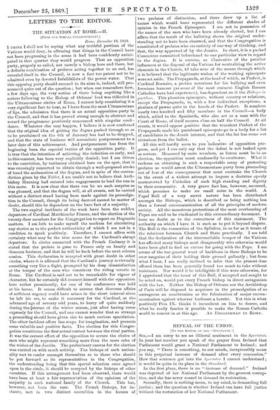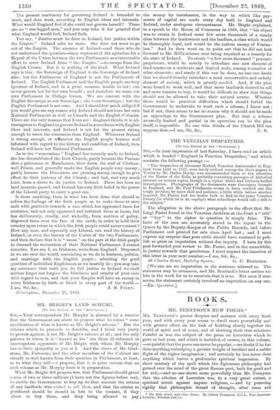REPEAL OF THE UNION.
[To THE EDITOR OF THE SPECTATOR.")
Srit,—I am sorry to see an illiberal sentiment in the Spectator. In your last number you speak of the prayer from Ireland that Parliament would grant a National Parliament to Ireland ; and you say, " There is something, to our minds, inexpressibly mean in this perpetual increase of demand after every concession." How that sentence got into the Spectator I cannot understand ; it would be quite in its place in the Standard.
In the first place, there is no " increase of demand." Ireland was deprived of her National Parliament by the grossest corrup- tion, and she has never ceased to demand its restoration.
Secondly, there is nothing mean, to my mind, in demanding full justice ; and the question is whether Ireland can have full justice without the restoration of her National Parliament. The present machinery for governing Ireland is intended to work, and does work, according to English ideas and interests. What would England feel if she could not govern herself? There are no " one-legged men," and you may take it for granted that what England would feel, Ireland feels.
You say, " Justice must be done to Ireland, but justice within the Empire." Ireland asks no more. She does not want to go out of the Empire. The enemies of Ireland—and those who do not understand the question—have represented the agitation for a Repeal of the Union between the two Parliaments as a treasonable effort to sever Ireland from " the Empire,"—to escape from the English Crown. But it is nothing of the kind. What Ireland says is this : the Sovereign of England is the Sovereign of Ireland also ; but the Parliament of England is not the Parliament of Ireland. The English Parliament and the English people are very ignorant of Ireland, and in a great measure hostile to her ; can never govern her for her own benefit ; and therefore we want our own Parliament in College Green. We are content with the English Sovereign as our Sovereign ; she is our Sovereign ; but the English Parliament is not ours. And I should feel much obliged if you would give me any reason why Ireland should not have her own National Parliament as well as Canada and the English Colonies. These are the only reasons that I can see : England thinks it is ad- vantageous to England to govern Ireland in accordance with English ideas and interests, and Ireland is not for the present strong enough to wrest the concession from England. Whenever Ireland is strong enough, or whenever the English people become well informed with regard to the history and condition of Ireland, then Ireland will have her National Parliament.
As to the " concessions" England has recently made to Ireland, she has disestablished the Irish Church, partly because the Fenians shot a policeman at Manchester, blew down the wall of Clerken- well Prison, and generally made the English people very uneasy ; partly because the Dissenters are growing strong enough to give effect to their jealousy of the Church ; and last, and very much least, from a desire to do justice to Ireland. There has been no land measure passed, and Ireland has very little belief in the power of the Liberal party to carry a good one.
Is there anything, then, in what has been done that should so soften the feelings of the Irish people as to make them at once melt with gratitude towards a race which has oppressed them for centuries, and not only oppressed and tortured them at home, but has deliberately, cruelly, and wickedly, from motives of policy, dispersed them over the face of the earth, in order to hold their country upon terms to which the Irish people could never consent? How any man, and especially any Liberal, can read the history of Ireland, or even the history of the Union of the two Parliaments, and then declare that it is " mean " on the part of the Irish people to demand the restoration of their National Parliament, I cannot conceive. You see, I, an Irishman, write from England. Dispersed as we are over the world, associating as we do in business, politics, and marriage with the English people ; admiring the good qualities of individual Englishmen as we heartily do ; you may take my assurance that until you do full justice to Ireland we shall neither forget nor forgive the blindness and cruelty of your race with regard to ours, and that your Empire will have an enemy in every Irishman by birth or blood iu every part of the world.—
I am, Sir, &c., J. S. FOLEY. Birmingham, December 21, 1869.



































 Previous page
Previous page